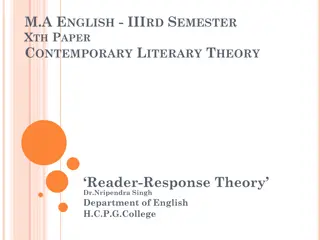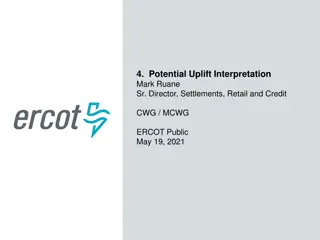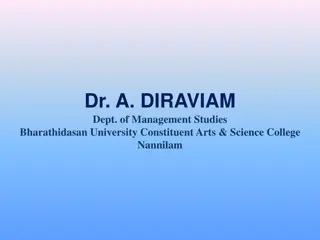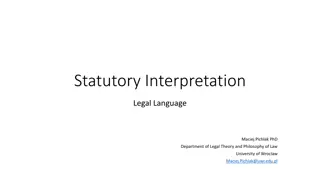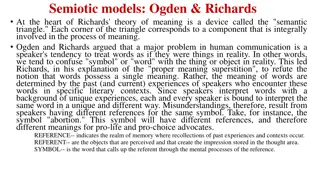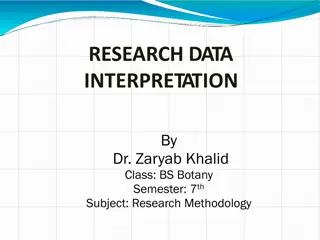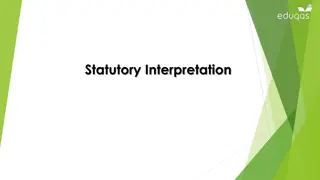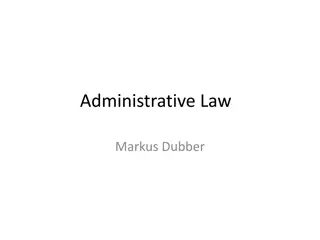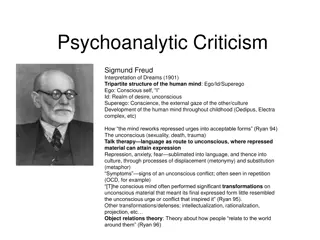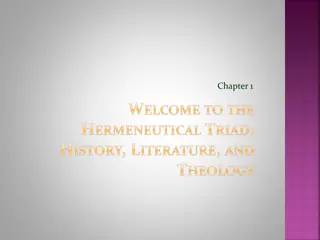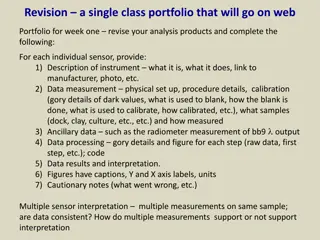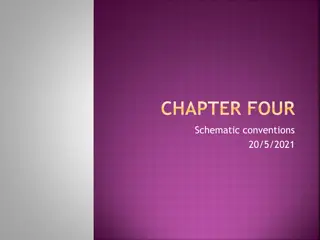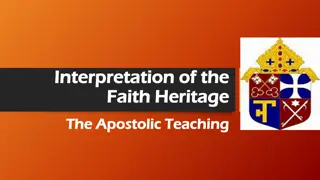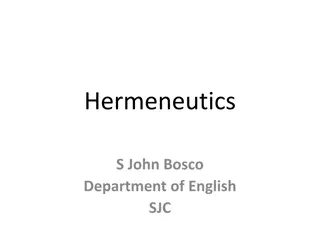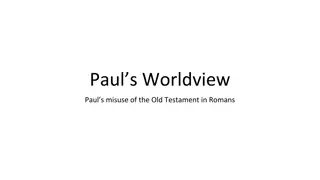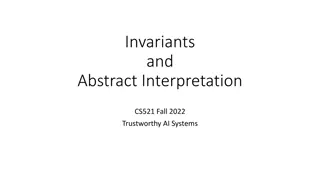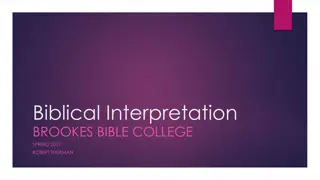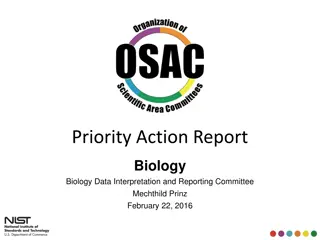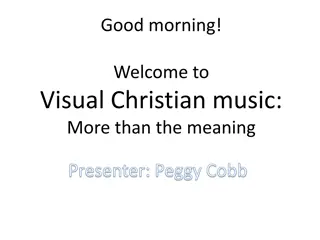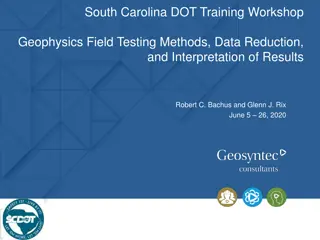Ginzburg Landau phenomenological Theory
The Ginzburg-Landau phenomenological theory explains superconductivity and superfluidity as distinct thermodynamic phases. It focuses on phase transitions characterized by singularities in specific heat at the transition temperature. Derived from BCS theory, it quantifies condensation energy, emphas
1 views • 38 slides
Crystal Field Theory in Transition Metal Complexes
Crystal Field Theory (CFT) explains the colors and magnetic properties of transition metal complexes. It focuses on the energy changes in d-orbitals of metal ions caused by surrounding ligands. This theory, developed in 1929, provides insights into the bonding interactions in complex compounds. The
10 views • 44 slides
Interpretation
Interpretation in research methodology involves drawing inferences from collected data, establishing continuity in research, and developing explanatory concepts for future studies. It helps researchers understand abstract principles, make predictions, and maintain research continuity. Interpretation
4 views • 5 slides
Evolution of Mathematical Theories and Proof Systems
Development of mathematical theories such as model theory, proof theory, set theory, recursion theory, and computational complexity is discussed, starting from historical perspectives with Dedekind and Peano to Godel's theorems, recursion theory's golden age in the 1930s, and advancements in proof t
1 views • 29 slides
Psychological Theories of Criminality: Understanding the Roots
Psychological theories of criminality delve into the association between intelligence, personality, learning, and criminal behavior. Major theories include Psychodynamic Theory by Freud, Behavioral Theory by Bandura, and Cognitive Theory by Kohlberg. These theories explore how unconscious mental pro
1 views • 20 slides
Understanding the Theory of Firms: Neoclassical vs. Modern Approaches
The theory of firms is explored through the Neoclassical and Modern perspectives. Neoclassical theory focuses on profit maximization, while Modern theory delves into managerial, principal-agent, and transaction cost theories. The discussion covers criticisms of Neoclassical theory and the essential
1 views • 79 slides
Understanding Reader-Response Theory in Literary Criticism
Reader-response criticism in literary theory emphasizes the reader's role in interpreting and creating meaning from a literary work. This theory contrasts with approaches focusing solely on the author or text, highlighting the active engagement of readers in shaping the significance of a piece of li
1 views • 7 slides
Understanding Potential Uplift Interpretation in ERCOT Protocols
ERCOT's Potential Uplift Interpretation Protocol defines Potential Uplift as the potential uplift to the Counter-Party based on short payments. The protocol outlines calculations and clarifies language ambiguity to ensure accurate interpretation. ERCOT seeks market feedback for further clarification
1 views • 6 slides
Understanding Literary Criticism: A Comprehensive Overview
Literary criticism involves the study, evaluation, and interpretation of literature, focusing on themes, styles, settings, and historical contexts. This discipline explores the meanings, workings, and values of literary works through interpretation, analysis, and evaluation. Various types of literar
2 views • 20 slides
Understanding Research Interpretation and Report Writing in Management Studies
Interpretation in research involves drawing inferences from collected facts to find broader meanings of findings. Techniques such as generalization, concept formulation, and consulting experts help ensure correct interpretation. Writing research reports is a crucial component, requiring logical anal
0 views • 25 slides
Understanding Statutory Interpretation in Legal Context
Explore the intricacies of statutory interpretation, linguistic and non-linguistic methods, and types of interpretation in legal contexts. Uncover the significance of legal reasoning, historical perspectives, and comparisons between Anglo-Saxon and Continental legal cultures. Delve into the complexi
1 views • 17 slides
Theories of Causation in Psychological and Social Sciences
Overview of theories of causation categorized into psychological, social psychological, and sociological perspectives. Psychological theories focus on instinctive, biological, and psychological qualities of abusers, including Attachment Theory, Psychodynamic Theory, Social Learning Theory, and Situa
0 views • 15 slides
Understanding Political Theory through a Contextual Approach
Exploring G.H. Sabine's perspective on political theory through a contextual approach, emphasizing the importance of historical context and societal influences. Sabine argues that while political theory evolves with its contemporary politics, it should be analyzed within its specific time and social
0 views • 9 slides
Semiotic Models: Theory of Meaning by Ogden & Richards
Ogden & Richards proposed the theory of meaning through the "semantic triangle," emphasizing the role of past experiences in interpreting words. They highlighted the importance of distinguishing symbols from the actual referents to avoid misunderstandings. Additionally, Richards discussed the effect
0 views • 14 slides
Evolution of Light Theory: From Wave Theory to Quantum Theory
At the turn of the century, the discovery of the photoelectric effect challenged the wave theory of light, leading to the development of the quantum theory by Max Planck and Albert Einstein. This new theory introduced the concept of discrete energy units known as quanta, bridging the gap between wav
1 views • 62 slides
Research Data Interpretation
Principles and methods of data interpretation in research, transitioning from data to knowledge through analysis and inference. Importance of proper interpretation for drawing accurate conclusions and enhancing the value of research findings.
0 views • 33 slides
Dp-branes, NS5-branes, U-duality, and M-Theory Overview
Overview of Dp-branes, NS5-branes, and U-duality derived from nonabelian (2,0) theory with Lie 3-algebra. Introduction to M-theory, including M2-branes and M5-branes in the strong coupling limit. Discussion on BLG theory, Lorentzian Lie 3-algebra, and the ABJM theory for M2-branes.
1 views • 32 slides
Advanced Methods of Interpretation: Hermeneutics and Structuralism Lecture at Masaryk University
Understanding interpretation in cultural sociology through hermeneutics and structuralism is explored in Lecture III by Dr. Werner Binder at Masaryk University. The lecture delves into the art of interpretation, focusing on classical hermeneutics, Friedrich Schleiermacher's romantic hermeneutics, an
1 views • 37 slides
Understanding Statutory Interpretation: Rules, Approaches, and Challenges
Explore the concept of statutory interpretation, including the intention of Parliament, problems that can arise, various rules and approaches used in interpretation, aids and presumptions, criticisms, and the relationship between statutory interpretation, EU law, and precedent. The Literal Rule, a c
2 views • 26 slides
Understanding Three Approaches to Statutory Interpretation in Administrative Law
Explore the concepts of Ordinary Meaning, Context, and Three Approaches to Statutory Interpretation in Administrative Law through insightful discussions and relevant examples. Gain a deeper understanding of legal interpretation principles and their application in legal frameworks.
1 views • 14 slides
Understanding Time-Independent Perturbation Theory in Quantum Mechanics
Perturbation theory is a powerful tool in solving complex physical and mathematical problems approximately by adjusting solutions from a related problem with known solutions. This theory allows for more accurate approximate solutions by treating the difference as a small perturbation. An example inv
0 views • 19 slides
Ethical Theories: Divine Command vs. Virtue Theory Explained
Divine Command Theory asserts that morality is derived from God's commands, contrasting with Virtue Theory which focuses on developing moral virtues to achieve human flourishing and excellence. Divine Command Theory relies on religious texts, while Virtue Theory emphasizes the cultivation of virtues
0 views • 24 slides
Overview of Psychoanalytic Criticism and Object Relations Theory
Psychoanalytic Criticism, originating with Sigmund Freud and further developed by Melanie Klein and Jacques Lacan, explores the intricate workings of the human mind, delving into the tripartite structure of the ego, id, and superego. The theory encompasses concepts such as the interpretation of drea
0 views • 10 slides
Understanding Fermi Liquid Theory in Interacting Fermion Systems
Fermi liquid theory, also known as Landau-Fermi liquid theory, is a theoretical model that describes the normal state of metals at low temperatures. Introduced by Landau and further developed by Abrikosov and Khalatnikov, this theory explains the similarities and differences between interacting ferm
0 views • 23 slides
Exploring Biblical Interpretation: History, Literature, and Theology
Delve into the importance of skilled biblical interpretation, the cost of failed interpretation, and the essential characteristics of a biblical interpreter. Understand the significance of humility, the role of the Spirit, and the need for accuracy in handling the Word of God. Learn about the hermen
0 views • 23 slides
Comprehensive Sensor Portfolio Analysis for Data Interpretation
This portfolio revision focuses on providing detailed descriptions and analysis of individual sensors for data collection and interpretation. It includes information on instrument specifications, data measurement setups, ancillary data, data processing steps, results interpretation, and cautionary n
0 views • 5 slides
Computational Learning Theory: An Overview
Computational Learning Theory explores inductive learning algorithms that generate hypotheses from training sets, emphasizing the uncertainty of generalization. The theory introduces probabilities to measure correctness and certainty, addressing challenges in learning hidden concepts. Through exampl
0 views • 43 slides
Automata Theory and Theory of Computation Overview
This course overview covers concepts in automata theory and theory of computation, including formal language classes, grammars, recognizers, theorems in automata theory, decidability, and intractability of computational problems. The Chomsky hierarchy, interplay between computing components, modern-
0 views • 42 slides
Understanding Schema Theory: A Guide to Mental Representations
Schema theory in social science refers to the mental structures individuals use to organize knowledge and guide cognitive processes. This theory, prevalent in the 1980s, aids in interpreting and predicting the world by categorizing objects and events based on common elements. Schema theory in lingui
0 views • 20 slides
Understanding the Role of Dogmas and Interpretation in Faith Heritage
The interpretation of faith heritage, apostolic teaching, and the role of dogmas in the Church form a foundation of belief that guides the spiritual journey. An authentic interpretation of God's Word is entrusted to the teaching office of the Church, emphasizing the connection between divine truths,
0 views • 9 slides
Theories of Interest in Microeconomics II
Explore various theories of interest in economics, including the Classical Theory, Liquidity Preference Theory by Keynes, Productivity Theory, Abstinence Theory, Time-Preference Theory, Fisher's Time Preference Theory, and the Loanable Fund Theory. These theories offer different perspectives on the
0 views • 6 slides
Understanding Hermeneutics: Exploring Interpretation and Meaning
Hermeneutics, a vital part of theology and philosophy, delves into understanding text and interpretation. Influenced by prominent thinkers like Heidegger and Ricoeur, it emphasizes the historical encounter and personal experience within the world. The concept of hermeneutical circle and the two area
0 views • 24 slides
Exploring the Evolution of Atomic Theory
Delve into the historical journey of atomic theory starting from Democritus and Aristotle's views to modern advancements proving some aspects of Dalton's theory incorrect. Learn about key laws and theories such as the Particle Theory of Matter, Dalton's Atomic Theory, and JJ Thomson's discoveries, s
0 views • 30 slides
The Interpretation of Messiah in Paul's Worldview
Paul's interpretation of the Old Testament in Romans is discussed regarding the portrayal of Jesus as Messiah. Scholars debate the alignment between the OT and NT perspectives on Messiah, exploring hermeneutics and biblical interpretation methods. The significance of understanding the Hebrew Bible's
0 views • 27 slides
Understanding Invariants and Abstract Interpretation in Trustworthy AI Systems
Invariants and Abstract Interpretation are crucial concepts in building trustworthy AI systems. This involves defining configurations, concrete semantics, set semantics, and handling programs with loops. Monotonic functions play a vital role in ensuring consistency in the interpretation of these sys
0 views • 22 slides
Importance of Proper Hermeneutics in Biblical Interpretation
Hermeneutics, the science of biblical interpretation, is crucial in understanding and applying the Word of God accurately. It involves rules and methods to determine the intended meaning of the text. Proper hermeneutics ensures correct belief, application, and interpretation of the Bible while avoid
0 views • 170 slides
Forensic Biology Data Interpretation Committee Overview
The Biological Data Interpretation and Reporting Committee focuses on establishing best practices, guidelines, and standards for forensic DNA laboratory interpretation. Their goal is to ensure quality and consistency in the forensic community by standardizing scientifically valid methods of interpre
0 views • 26 slides
Workshop on Visual Christian Music Interpretation with Peggy Cobb
This workshop delves into the art of interpreting music visually, focusing on incorporating styles, rhythms, and presentation elements to convey the essence of a song in American Sign Language. Participants will explore modern and hymnal Christian music genres, alongside pop and country songs, to en
0 views • 15 slides
Geophysics Field Testing Workshop: Methods and Interpretation
South Carolina DOT Training Workshop on geophysics field testing methods, data reduction, and interpretation of results by Robert C. Bachus and Glenn J. Rix. The workshop covers suspension logging, borehole geophysical logging, geotechnical testing, and geophysical service companies such as Schlumbe
0 views • 11 slides
Macromechanical Analysis of Lamina and Tsai-Hill Failure Theory Overview
The Tsai-Hill failure theory is based on the strengths of a unidirectional lamina, incorporating longitudinal and transverse tensile and compressive strengths, as well as in-plane shear strength. This theory, derived from the distortion energy theory, provides criteria for determining lamina failure
0 views • 15 slides






